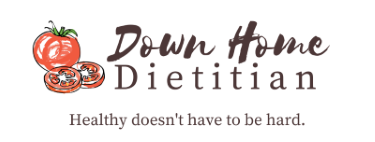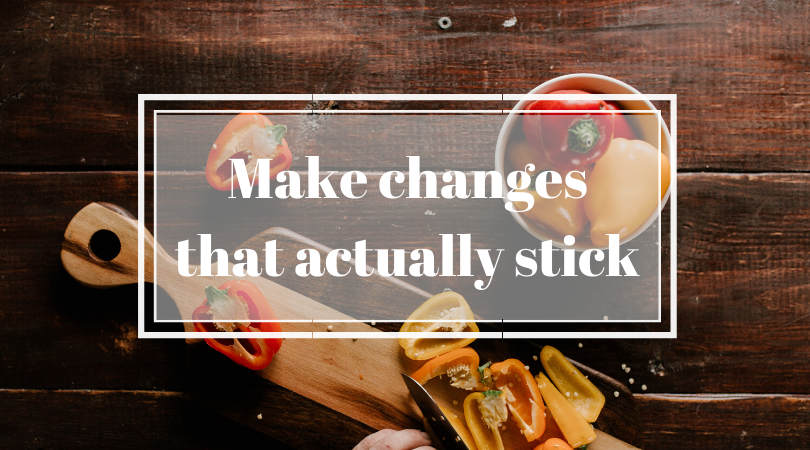How to Build Sustainable Healthy Habits
We are past the halfway point of January – did you make health goals this year? Resolutions? How are they doing? Here are a few of my best tips on making changes that stick!
Key #1: Before you change anything
Decide carefully how you will achieve your goals. For many years, scientists have been studying methods for weight loss to find the “best” way to get pounds off. The surprising result of a lot of this research is that so many methods work. A lot of nutritionists have taken to saying, “diets don’t work.” It might be semantics but in general, if the goal is to lose weight – most fad diets do work. Whether it’s low carb, low fat, low calorie, or portion control – weight typically comes off.1-5 If they didn’t work at all for losing weight, word would get around pretty quickly and they would never become popular.
Here’s the kicker (besides that many fad diets aren’t safe): the statistics for maintaining weight loss after a diet are horrendous. Long-term studies show that five years after short-term diets the result is an average regain to anywhere from a net loss of only 6 lbs to a gain of 10-21% of pre-diet weight.2,6 Yikes!
Many fad diets can be extreme, overly restrictive, or just plain miserable (or option d, all of the above). Most people beginning a diet program are willing to commit to short-term pain for long-term gain. Unfortunately, the reality is that long-term dieting is generally not sustainable, and weight loss from short-term dieting is temporary.
But fear not – all hope is not lost! The National Weight Control Registry is comprised of people who have successfully lost at least 30 lbs and kept it off for at least a year, though most participants have lost an average of 72.6 lbs and kept it off for more than 5 years.7 Their participants report that ongoing, long-term participation in sustainable habit changes has been key to their success, as opposed to radical, short-term dieting. You can read more about their habit changes at the National Weight Control Registry website.
All these studies show that a pivotal ingredient for long-term success with wellness, weight loss, muscle gain, or any habit change is sustainability. One of my favorite quotes sums up the wisdom behind this:
“Begin as you mean to go on, and go on as you began, and let the Lord be all in all to you.”
-Charles H. Spurgeon
Some may wonder what the last phrase has to do with wellness, and personally I believe it is vitally important (and apparently so did Spurgeon since he tacked it on there), so I included it. Regardless of how you feel about God, however, the sentiment is to not even begin a habit change that you can’t commit to long-term. Find changes that work with your lifestyle, not against it.
Recognize that temporary habit changes create temporary results. You can tweak them, change them, or adjust to the fluidity of life as needed, but if your habit changes disappear completely, so will the fruits of your labors.
Key #2: After you’ve met your goals
You’ve done it, congratulations! You’ve met your goal! You’ve placed a new brick in the healthy foundation upon which you can continue building the life you want. Guess what? You’re not done! If you want to continue to enjoy the benefits of your progress, you must grab hold of the second key to long-term success:
Always have a goal and a sustainable plan to achieve it.
Achieving a goal merits celebration, and also the exciting task of deciding what your next goal will be. It doesn’t have to be intense – your goal could be maintenance and your plan might be walking – but you need to have both or you’ll watch all your hard work and health benefits slip away. Living a healthy life is swimming upstream in our culture – you can not coast into good health.
_______________________________________
Have a goal of your own but need help finding a sustainable plan that fits your lifestyle? Contact me or schedule an appointment to start building a healthy foundation for the life you want!
- https://academic.oup.com/jcem/article-lookup/doi/10.1210/jc.2002-021480
- http://onlinelibrary.wiley.com/doi/10.1038/oby.2001.134/full
- http://jamanetwork.com/journals/jamainternalmedicine/fullarticle/412650
- http://onlinelibrary.wiley.com/doi/10.1038/oby.2004.61/full
- http://ajcn.nutrition.org/content/53/5/1124.short
- http://europepmc.org/abstract/med/2613427, http://ajcn.nutrition.org/content/74/5/579.short
- http://ajcn.nutrition.org/content/82/1/222S.short





Leave a Comment